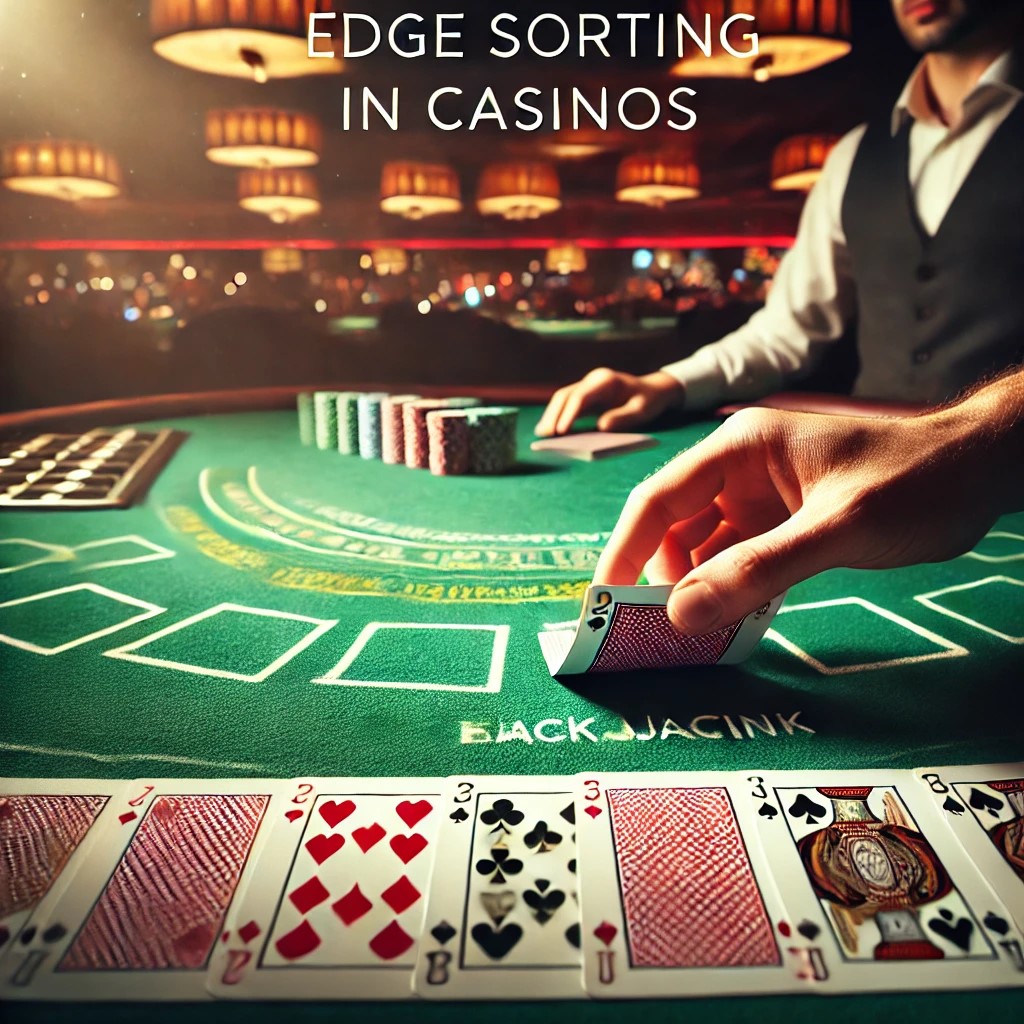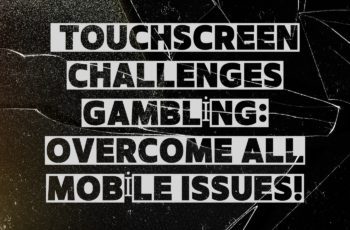Edge sorting in casinos is a technique that some gamblers use to gain an advantage by exploiting subtle differences on the edges of playing cards. This controversial method has garnered significant attention due to high-profile cases involving professional gamblers and the legal battles that ensued. Understanding edge sorting is crucial for both players and casino operators to navigate the fine line between skillful play and cheating.
Table of Contents
- What is Edge Sorting in Casinos?
- Is Edge Sorting Legal in Casinos?
- How Does Edge Sorting Work?
- Why is Edge Sorting Controversial?
- Can Edge Sorting Be Detected?
- What Games Are Susceptible to Edge Sorting?
- How to Prevent Edge Sorting in Casinos?
- Who is Phil Ivey and How Did He Use Edge Sorting?
- What Are the Legal Consequences of Edge Sorting?
- Is Edge Sorting Considered Cheating?
- How Do Casinos Respond to Edge Sorting?
- What are the Risks of Edge Sorting for Players?
- Can You Get Banned for Edge Sorting?
- Are There Famous Cases of Edge Sorting?
- How Does Edge Sorting Compare to Card Counting?
- What Techniques are Used in Edge Sorting?
- Is Edge Sorting Effective in Winning?
- How to Identify Edge Sorting in Card Games?
- What is the History of Edge Sorting?
- How to Use Edge Sorting in Blackjack?
- What are the Ethical Implications of Edge Sorting?
- How Does Edge Sorting Affect Casino Profits?
- What are the Tools Needed for Edge Sorting?
- How Do Professional Gamblers Use Edge Sorting?
- What Role Does Casino Security Play in Edge Sorting?
- How Does Edge Sorting Impact Other Players?
- Can Edge Sorting be Used in Online Casinos?
- What are the Differences Between Edge Sorting and Other Techniques?
- How to Learn Edge Sorting Techniques?
- Are There Legal Ways to Use Edge Sorting?
1. What is Edge Sorting in Casinos?
Edge sorting is an advantage gambling technique where a player identifies whether a face-down card is likely to be low or high by noticing and exploiting subtle, unintentional differences on the backs of the dealt cards in casino table games (Wikipedia) .
When it comes to gaining an advantage in casino games, various strategies and techniques have been developed by players over the years. One such technique is edge sorting, a method that involves identifying subtle imperfections on the backs of playing cards to predict their value. In the video “Edge Sorting – The Complete Guide,” you’ll dive deep into this intriguing strategy, learning about its origins, how it works, and the famous cases where it has been used to win significant sums of money. This comprehensive guide provides valuable insights into the world of edge sorting, shedding light on both its complexity and the controversies surrounding its use in casinos.
As you explore the video and gain a thorough understanding of edge sorting, it sets the stage for a more focused discussion on its implications and applications in casinos. Our blog will delve into the specifics of how edge sorting has been employed in real-world casino scenarios, examining notable instances and the legal battles that ensued. We’ll also explore the measures casinos have taken to counteract this technique and ensure fair play. Join us as we uncover the fascinating dynamics of edge sorting in casinos, discussing its impact on the gaming industry and what it means for both players and casino operators.

Edge sorting in casinos is a technique where players exploit minor imperfections on the edges of playing cards to gain a predictive advantage. By identifying these imperfections, players can determine the value of cards before they are revealed, giving them a significant edge over the house. This method relies heavily on keen observation and memory, making it a skill-intensive but controversial strategy.
2. Is Edge Sorting Legal in Casinos?
Yes and no. The legality of edge sorting varies by jurisdiction and is often subject to interpretation. While some courts have ruled that it constitutes cheating, others have recognized it as a legitimate advantage play. The controversy stems from whether the method involves manipulating the game or simply taking advantage of manufacturing flaws in the cards.
3. How Does Edge Sorting Work?
Edge sorting works by identifying and memorizing imperfections on the edges of cards. These imperfections, often caused by the manufacturing process, can be used to distinguish high-value cards from low-value ones. Players typically request specific conditions, such as having the dealer rotate high-value cards, to exploit these imperfections during play. This technique is most effective in games like baccarat and blackjack.
4. Why is Edge Sorting Controversial?
Yes, edge sorting is controversial because it blurs the line between skillful play and cheating. Casinos argue that it undermines the integrity of the game, while proponents claim it is a legitimate strategy that takes advantage of card imperfections. High-profile legal cases, such as those involving Phil Ivey, have fueled the debate, with varying court rulings adding to the controversy.
5. Can Edge Sorting Be Detected?
Yes, edge sorting can be detected, but it requires vigilant casino staff and advanced surveillance techniques. Casinos employ measures like shuffling machines, card rotation policies, and close monitoring of player behavior to identify and prevent edge sorting. Detection is challenging, however, because the method relies on subtle cues that are not easily noticeable.
6. What Games Are Susceptible to Edge Sorting?
Games like baccarat and blackjack are particularly susceptible to edge sorting due to their use of high-value cards. In these games, knowing the value of specific cards can significantly impact the player’s decisions and potential winnings. Other card games with similar card handling practices may also be vulnerable.
7. How to Prevent Edge Sorting in Casinos?
Yes, casinos can prevent edge sorting by implementing several strategies. These include using automatic shufflers, rotating cards frequently, inspecting cards for imperfections, and training staff to recognize suspicious behavior. Additionally, casinos can switch to cards with uniform edges, reducing the possibility of edge sorting.
8. Who is Phil Ivey and How Did He Use Edge Sorting?
Phil Ivey is a renowned professional poker player who famously used edge sorting to win millions in baccarat. By collaborating with a partner to spot imperfections on the cards, Ivey was able to gain an advantage over the casino. His legal battles over the winnings brought significant attention to edge sorting and its implications in the gambling world.
9. What Are the Legal Consequences of Edge Sorting?
Yes, players caught edge sorting can face severe legal consequences, including lawsuits, fines, and bans from casinos. The legal outcomes depend on the jurisdiction and the specific circumstances of the case. Some players have successfully defended their actions as legitimate advantage play, while others have been penalized for cheating.
10. Is Edge Sorting Considered Cheating?
Yes and no. Whether edge sorting is considered cheating depends on the perspective. Casinos generally view it as cheating because it exploits imperfections in the cards, while some players and courts see it as a legitimate strategy. The ethical debate continues, with opinions divided on the fairness of edge sorting.
11. How Do Casinos Respond to Edge Sorting?
Casinos respond to edge sorting by implementing stricter security measures, training staff to detect suspicious behavior, and using higher quality cards. In some cases, casinos have pursued legal action against players suspected of edge sorting. These responses aim to maintain the integrity of the games and protect the house’s interests.
12. What are the Risks of Edge Sorting for Players?
Yes, edge sorting carries significant risks for players, including legal repercussions, financial losses, and permanent bans from casinos. Additionally, the skill required to successfully execute edge sorting means that only a few players can use it effectively. Failure to execute the technique properly can lead to detection and severe consequences.
13. Can You Get Banned for Edge Sorting?
Yes, players can get banned for edge sorting. Casinos take a hard stance against any methods perceived as cheating, and players caught edge-sorting may face immediate expulsion and blacklisting from other casinos. The ban can extend to both land-based and online casinos, significantly limiting the player’s opportunities to gamble.
14. Are There Famous Cases of Edge Sorting?
Yes, there are several famous cases of edge sorting, with Phil Ivey’s case being the most notable. In 2012, Ivey used edge sorting to win approximately $10 million at the Borgata Hotel Casino & Spa. The casino sued him, and the legal battle highlighted the controversy surrounding edge sorting. Other lesser-known cases also illustrate the method’s effectiveness and the resulting disputes.
15. How Does Edge Sorting Compare to Card Counting?
Edge sorting and card counting are both advantage play techniques, but they differ significantly in execution and perception. Card counting involves tracking the ratio of high to low cards remaining in the deck to make better betting decisions, primarily in blackjack. Edge sorting, on the other hand, exploits physical imperfections on the cards. While card counting is generally considered legal but frowned upon by casinos, edge sorting is often viewed as cheating and can lead to legal consequences.
16. What Techniques are Used in Edge Sorting?
Techniques used in edge sorting include identifying imperfections on card edges, memorizing these imperfections, and requesting specific card rotations from the dealer. Players may also use visual aids or partners to enhance their ability to spot the differences. Successful edge sorting requires a combination of keen observation, memory, and strategic manipulation of the dealer.
17. Is Edge Sorting Effective in Winning?
Yes, edge sorting can be highly effective in winning when executed correctly. The method has been used by professional gamblers to win millions of dollars. However, its effectiveness depends on the player’s skill in identifying and memorizing card imperfections, as well as their ability to avoid detection by the casino.
18. How to Identify Edge Sorting in Card Games?
Identifying edge sorting in card games requires careful observation and knowledge of common techniques. Casino staff should look for players who request specific card orientations, exhibit unusual focus on card edges, or show signs of collaboration with partners. Surveillance footage and close monitoring can also help detect edge sorting activities.
19. What is the History of Edge Sorting?
The history of edge sorting dates back to the early days of card games, but it gained significant attention in the 21st century due to high-profile cases. The technique has evolved with advancements in card manufacturing and casino security. Notable cases like Phil Ivey’s have brought edge sorting into the spotlight, leading to increased awareness and preventive measures.
20. How to Use Edge Sorting in Blackjack?
Using edge sorting in blackjack involves identifying and memorizing imperfections on the edges of high-value cards, such as aces and face cards. Players typically request the dealer to rotate certain cards, making it easier to distinguish them later. By recognizing these cards during play, players can adjust their bets and strategies to maximize their chances of winning. However, the technique requires precision and can be risky due to the high likelihood of detection.
21. What are the Ethical Implications of Edge Sorting?
Yes, edge sorting raises significant ethical questions. While some view it as a clever use of observational skills, others see it as an unfair manipulation of the game. The ethical debate centers around whether taking advantage of manufacturing flaws constitutes cheating. Casinos argue that it undermines the spirit of fair play, while proponents claim it is a legitimate strategy.
22. How Does Edge Sorting Affect Casino Profits?
Edge sorting can have a substantial impact on casino profits. Successful edge sorters can win large sums of money, potentially causing significant financial losses for the casino. To mitigate these losses, casinos invest in better card manufacturing, advanced surveillance, and staff training. Despite these measures, the occasional success of edge sorters demonstrates the ongoing challenge casinos face in maintaining fair play.
23. What are the Tools Needed for Edge Sorting?
The tools needed for edge sorting are primarily observational skills and a sharp memory. Some players may use visual aids, such as magnifying glasses or marked cards, to enhance their ability to spot imperfections. Collaboration with a partner can also be beneficial. However, the most critical tools are the player’s ability to remain undetected and to manipulate the dealer subtly.
24. How Do Professional Gamblers Use Edge Sorting?
Professional gamblers use edge sorting by meticulously studying the cards for imperfections and developing strategies to exploit them. They often work in pairs, with one person focusing on identifying the marks and the other making strategic betting decisions. High-profile gamblers like Phil Ivey have demonstrated how edge sorting can be used to win significant amounts, although the legal and ethical ramifications remain contentious.
25. What Role Does Casino Security Play in Edge Sorting?
Casino security plays a crucial role in detecting and preventing edge sorting. Security measures include advanced surveillance systems, frequent card rotation, and staff training to recognize suspicious behavior. Casinos also use high-quality cards with uniform edges to reduce the chances of edge sorting. Despite these efforts, the subtle nature of edge sorting means that some cases may go undetected.
26. How Does Edge Sorting Impact Other Players?
Yes, edge sorting can negatively impact other players. When a player successfully uses edge sorting, it can distort the fairness of the game, leading to skewed outcomes. Other players may unknowingly face an unfair disadvantage, which can affect their gaming experience and perceptions of the casino’s integrity. Casinos strive to prevent such scenarios to maintain a fair and enjoyable environment for all patrons.
27. Can Edge Sorting be Used in Online Casinos?
No, edge sorting cannot be used in online casinos. Online casino games use digital cards, which do not have physical imperfections that can be exploited. The random number generators (RNGs) used in online casinos ensure that each card dealt is random and fair, making edge sorting impossible. Players looking for advantage play techniques must rely on other strategies when playing online.
28. What are the Differences Between Edge Sorting and Other Techniques?
Edge sorting differs from other advantage play techniques, such as card counting and shuffle tracking, in its reliance on physical card imperfections. Card counting involves tracking the ratio of high to low cards remaining in the deck, while shuffle tracking follows specific cards through shuffling. Edge sorting is unique in its focus on exploiting manufacturing flaws, making it a distinct and controversial method.
29. How to Learn Edge Sorting Techniques?
Learning edge sorting techniques requires practice and a keen eye for detail. Aspiring edge sorters can start by studying the edges of playing cards under different lighting conditions to identify imperfections. Joining forums or groups of advantage players can provide valuable insights and tips. However, potential learners should be aware of the legal and ethical implications of using such techniques in casinos.
30. Are There Legal Ways to Use Edge Sorting?
No, there are generally no legal ways to use edge sorting in casinos. While some jurisdictions may not explicitly classify it as illegal, most casinos consider it cheating and will take action against players who use it. The best way to enjoy casino games is to play within the rules and regulations set by the casino, ensuring a fair and enjoyable experience for all participants.
Conclusion
Edge sorting in casinos remains a highly controversial and complex topic. While it offers a significant advantage to skilled players, it also poses ethical and legal challenges. Understanding the nuances of this technique is crucial for both players and casino operators. By exploring the various aspects of edge sorting, from its legality to its impact on casino profits, we can better appreciate the delicate balance between skillful play and fair gaming practices. As the gambling industry continues to evolve, so too will the strategies and countermeasures surrounding edge sorting, ensuring an ongoing debate in the world of casinos.
Thank you for reading about edge sorting in casinos. For the most up-to-date and reliable information, visit our website often. If you have any questions, write to us, and we will be happy to answer. Don’t hesitate to share your thoughts in the comments. We love hearing from you!

OnlineGameReview.ca, your premier destination for honest and comprehensive game reviews in Canada. Our mission is to provide unbiased and thorough evaluations of all types of games, including casino, slot, PS5, and PC games. We pride ourselves on highlighting both the positive and negative aspects of each game, ensuring our readers make informed decisions. At OnlineGameReview.ca, we do not accept payments for reviews, maintaining our commitment to transparency and trustworthiness. Join us as we explore the gaming world and keep you updated on the latest trends and game quality.


